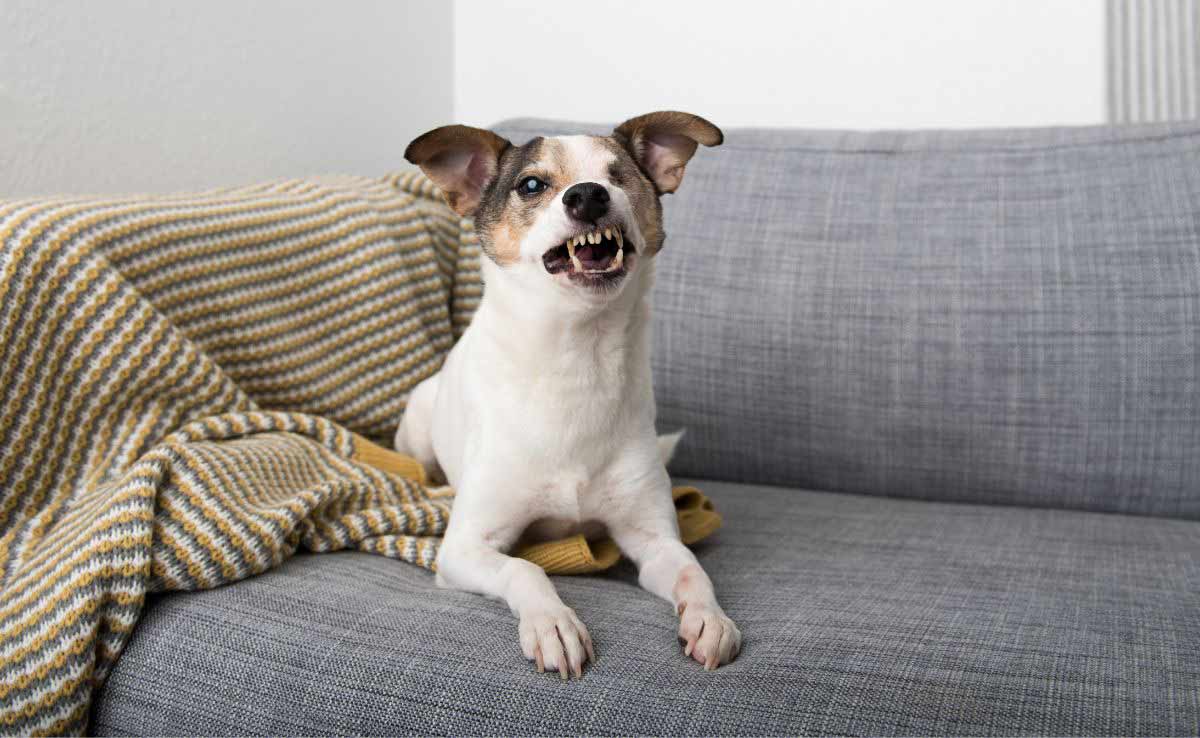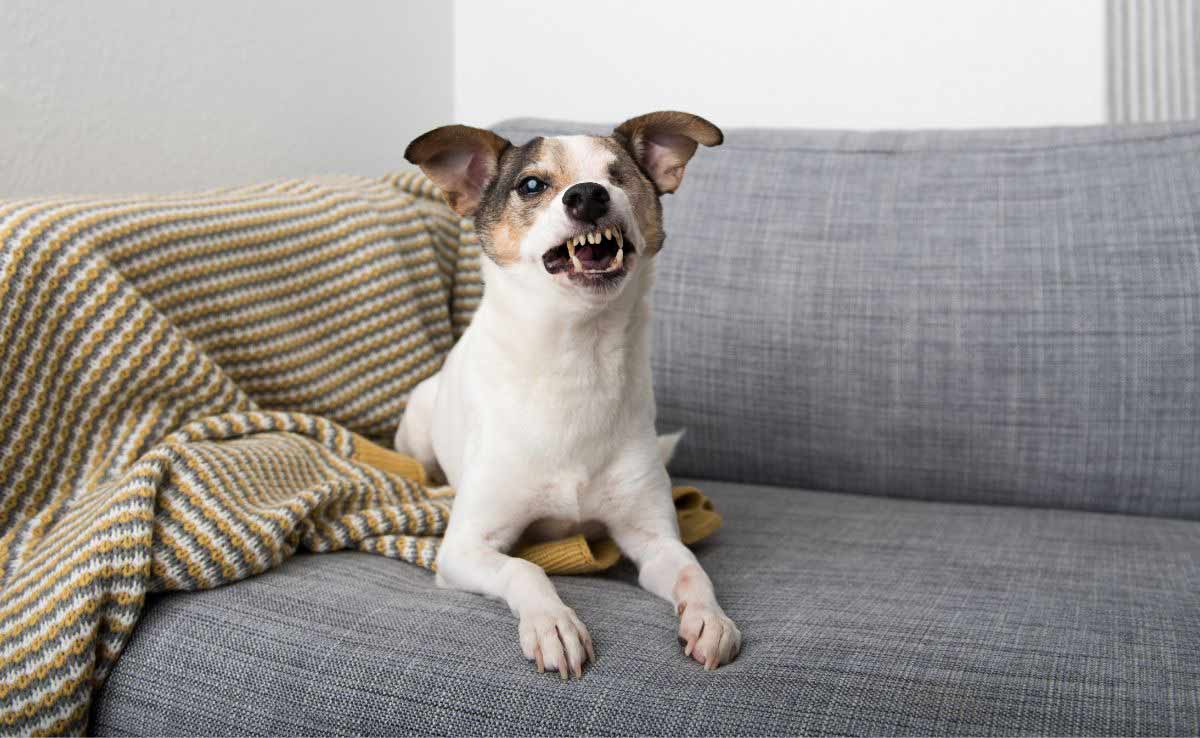
To keep the lights on, we receive affiliate commissions via some of our links. Our review process.

What does it mean when a dog growls? If you have a dog who growls and snarls often, you’re likely wondering if she’s overly aggressive, not well-trained, or suffering from other health or behavioral issues. Dogs growl for different reasons, and it’s often simply a normal way they communicate. However, in some cases, dog growling can signal an underlying problem that needs to be addressed. We’ll help you try to figure out why your pup is growling in different situations and when it’s a cause for concern.
Why Do Dogs Growl?
Contents
When a dog growls, what does it mean? Dogs use growling as a means of communication. They even use various types of growls to express different emotions and meanings to other canines and humans. In a 2017 study, researchers found that humans can understand the emotions behind different dog growls. Women and dog owners showed a better ability than others in the study.
If you pay close attention to how your dog vocalizes her growls in different situations, along with her body language, you may become a pro at deciphering what she’s trying to tell you. Here are the most common reasons our furry friends growl.
As A Warning
You’re likely familiar with dog snarling and growling as a warning sign. Depending on the situation and who’s at the receiving end, you’ll need to make sure warning growls don’t escalate to biting. Warning growls can last longer than other types of growls and are lower in tone. They can also be accompanied by aggressive body language, such as a stiffened body, hair standing up on the back, aggressive eye contact, and more. Several things cause our pups to let out a threatening-sounding growl.
- Fear & Stress: Many dogs growl when they feel threatened by strangers or in uncomfortable surroundings. It’s their warning sign to back off and leave them alone.
- Possessive Aggression: Some dogs are overprotective of their food bowls, toys, bones, etc., as a means of resource guarding. They’ll growl when people or other pets approach their prized possessions as a sign to stay away from them.
- Territoriality: Similar to possessiveness, some dogs are highly protective of their home and yard and will bark or growl when a stranger enters their sacred space.
From Pain
Some canines growl when they’re experiencing pain from an injury or illness. This occurs most often when you touch the area that’s bothering them. Growling from pain can be both a general sign that your pup is feeling bad and a warning not to touch her sore area. My pup, Tiny, who rarely growls, vocalized his discomfort and fear about what was going on by growling after he had surgery.
When Playing
Although most of us view growling as a sign of aggression, that’s not always the case. If your dog growls when playing with other dogs or with you, it often simply means she’s enjoying herself. When dogs play with each other, growling is usually just part of their game. Although every dog vocalizes in different ways, play growling can sound higher toned, with shorter bursts than warning growls.
It’s still important to keep an eye on your pup’s body language when playing with other dogs. If you notice louder, more harsh-sounding growling and signs of aggressive behavior, it’s time to end the play before it escalates into a fight.
What About Growling When Playing Tug-Of-War?
Should you play tug-of-war with your pup if he growls? Robert Cabral, a well-known certified dog behaviorist in the dog training world, answers this question in the brief video below.
How To Deal With Dog Growling
Expert Tip: Don’t ever punish dog and puppy growling because it’s a normal part of canine communication. Punishing your pup will only confuse her and make her more stressed, and the last thing you want to do is scold your dog for trying to communicate with you. If you teach your dog not to growl, then she’ll likely end up just going in for the bite with no warning.
Some types of growling are easiest handled by avoiding situations that cause it. For example, if your pup growls at other dogs or people while you’re on a walk, cross the street or take a less-populated route if possible. Avoid the dog park if it’s too stressful for your furry friend.
If your dog has a toy or bone and growls at you when you approach her, just leave her alone. It’s important to teach children to do the same when they’re around a possession-aggressive pup to avoid biting. Kids need to understand that growling is a warning sign to stay away.
However, if growling at people or other animals is a frequent problem with your pup, you may want to consider an online dog training course that teaches you ways to handle aggressive behavior, or you can get your pup behavioral therapy. With behavioral modification therapy, a certified behavioral therapist can address the root cause (anxiety, fear, aggression) of your pup’s growling. This can help your furry friend become a happier, more well-adjusted pup in many areas of her life.
Frequently Asked Questions
Here are some of the questions our readers ask most often about dog growling.
Why Does My Dog Growl At Me For No Reason?
Although you may not understand why your dog growls at you, she has a reason and is trying to tell you something. Pay close attention to what’s going on when your pup growls at you, her body language, and how the growl sounds.
In time, you may be able to figure out the reason, however subtle it may be. If your dog growls at you when you’re giving belly rubs or other forms of affection, that’s perfectly normal. Some pups emit low-key growls when they’re having a pleasurable experience.
What Do I Do If My Dog Growls At Me?
If you’re wondering what to do if your dog growls at you as a warning, the short answer is to stop what you’re doing and move away. Your pup is using growling as a way to ask you to leave her alone; it’s not an attempt to assert authority or alpha status over you.
Never punish or suppress growling. If you teach your dog not to growl, you’ll eliminate her normal warning method, and then she’ll likely go straight to biting. If your dog growls at you frequently, consult your veterinarian who can best evaluate the problem and offer solutions.
Why Do Dogs Growl At Other Dogs?
Our canine companions growl at other dogs for several different reasons — out of anxiety around a strange dog, when they feel cornered or threatened, or when playing with other pups as a sign of fun. Growling can be a normal response, but make sure to keep an eye on your dog’s body language. If your dog lunges or reacts aggressively toward another dog, you’ll need to learn how to deal with dog-on-dog aggression.
Does Your Dog Suffer From Anxiety?
If you think your furry friend’s growling could be anxiety-based, it can be helpful to learn more about the causes and signs of doggy anxiety. This can help you determine the extent of your pup’s stress. Many dogs only have select few anxiety triggers, like thunderstorms or fireworks.
But with other dogs, anxiety can become an all-encompassing, chronic problem that will only worsen over time. While there are many ways to help your stressed dog, you should consult your veterinarian to develop the best treatment plan for your pup.
Tagged With: Aggression